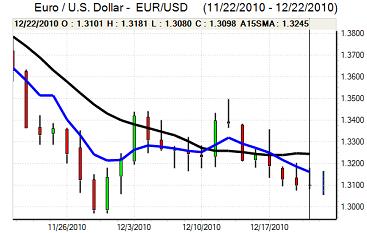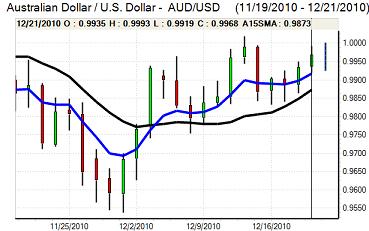EUR/USD
The Euro was unable to break above 1.3180 against the dollar in Europe on Wednesday and again registered losses later in the session as underlying sentiment remained negative.
Despite reports of Chinese buying, there was further speculation that Portugal would require EU support early in 2011 due to difficulties in raising funds through capital markets. From a medium-term perspective, there will also be a high degree of unease that market attention is starting to focus more on core economies such as France and Belgium. There has been greater speculation that these countries will be subjected to credit-rating downgrades in 2011 and such action would have serious implications for the Euro.
The US existing home sales data was slightly weaker than expected, but there was still an increase to an annual rate of 4.68mn for November from 4.43mn previously and there was a reported monthly increase in house prices. The dollar will gain some support from optimism over a firmer growth trend, but the US currency is still struggling on a trade-weighted basis as there has been a further flow of funds into commodity currencies.
The Euro retreated to low just below 1.3080 in New York before a tentative move back to above 1.31. As liquidity declines, there will be a continuing risk of erratic trading until the end of 2010.

Source: VantagePoint Intermarket Analysis Software
Call now and you will be provided with FREE recent forecasts
that are up to 86% accurate * 800-732-5407
If you would rather have the recent forecasts sent to you, please go here
Yen
The dollar rose briefly following the US economic data on Wednesday, but was unable to make any significant progress and dipped to lows around 83.30 in late US trading. There will be the scope for further capital repatriation ahead of the year-end period which will tend to put upward pressure on the yen and there will be the risk of erratic trading.
There has been further interest in commodity currencies which should tend to curb yen support, especially if there is a sustained improvement in risk appetite. The Finance Ministry will also be uneasy over yen strength and there is scope for further semi-official dollar buying over the next few days. The US currency still remained on the defensive in Asia on Thursday with Japanese markets closed for a holiday and there was a fresh decline to lows below 83.10.
Sterling
Sterling was unable to regain the 1.55 level against the dollar on Wednesday and was generally under pressure. Third-quarter GDP figure was revised to 0.7% from 0.8% while the second-quarter estimate was also revised down. Direct damage from the data should have been limited, but fears over the 2011 outlook also increased which had a negative Sterling impact. The other data was also weaker than expected with the third-quarter current account deficit rising to GBP9.6bn.
The Bank of England December MPC minutes revealed the same vote split as the previous 2 meetings with Sentence calling for higher interest rates while Posen wanted to expand quantitative easing. Within the minutes as a whole, there were increased concerns over inflation and this will lead to some speculation over a near-term move to tighten policy. There will still be a high degree of scepticism whether the bank will be in a position to increase rates and this will tend to undermine Sterling.
The UK currency dipped to lows close to 1.5350 against the dollar before finding some degree of respite and rebounding to the 1.5420 area with the Euro again testing resistance above 0.85.
Swiss franc
The Swiss currency maintained an extremely strong tone on the crosses during Wednesday and advanced to fresh record highs beyond 1.25 against the Euro. The dollar was also under strong pressure and retreated to lows near 0.95. The franc has found it relatively easy to break Euro support levels which suggests that underlying investment flows into the currency are very strong or that there has been heavy speculative buying.
If the moves have been broadly speculative, then there will be increased pressure for the National Bank to intervene and trigger an exodus from these positions. While Euro-zone fears persist, the franc will continue to secure underlying net inflows and there will be pressure on funds not to hold short franc positions ahead of year-end book closing.

Source: VantagePoint Intermarket Analysis Software
Call now and you will be provided with FREE recent forecasts
that are up to 86% accurate * 800-732-5407
If you would rather have the recent forecasts sent to you, please go here
Australian dollar
The Australian dollar again defied selling pressure on Wednesday and advanced to test resistance levels above parity against the US currency. There was further strength in commodity prices during the session which helped underpin the Australian currency, especially with risk appetite broadly firm.
There will be further institutional pressure to hold the Australian dollar into the year-end period which will tend to limit any selling pressure and there was a renewed push above parity on Thursday, although volatility levels are liable to increase.



